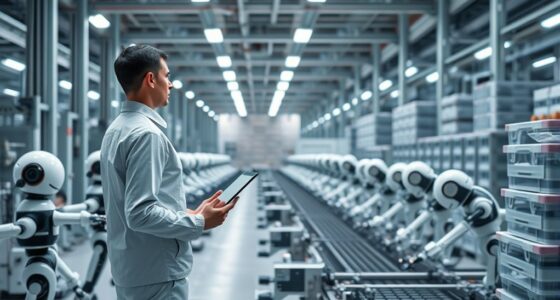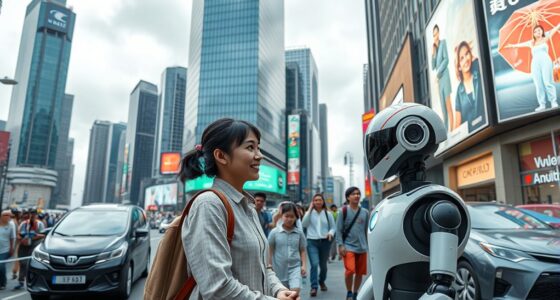As society shifts beyond traditional work, you’ll find that new policies focus on lifelong learning, social safety nets, and community engagement, enhancing resilience and inclusion. Automation and AI are transforming industries, but personal identity increasingly centers on creativity, social contributions, and well-being. Workforce demographics evolve, emphasizing skills like adaptability and lifelong learning. If you explore further, you’ll discover how these changes reshape what’s valued and how you can thrive in this post-labor economy.
Key Takeaways
- Societal value shifts from employment to community involvement, creativity, and social contributions as traditional work becomes less central.
- Technological advances like AI and automation reshape industries, emphasizing lifelong learning and adaptable skills beyond traditional jobs.
- Policy innovations foster resilience through portable safety nets, lifelong learning accounts, and investments in mental health and flexible work laws.
- Personal identity increasingly derives from social networks, creative pursuits, and community engagement rather than employment status.
- Recognition of diverse skills, including artistic and ethical hacking abilities, supports holistic well-being and societal security in a post-labor economy.
Shifting Employment Patterns and Sector Dynamics

As employment patterns continue to shift, certain sectors are driving most of the growth while others slow down or face uncertainty. Healthcare and social assistance, government, and leisure and hospitality accounted for nearly 75% of new jobs in the past year. However, growth in leisure and hospitality has slowed from 47,000 to 23,000 jobs per month, while government employment gains dropped from 58,000 to 38,000, with potential for further declines. Despite these changes, the unemployment rate remains stable around 4.2%, indicating resilience. Job creation in early 2025 slightly underperformed expectations, adding 143,000 jobs in January. Overall employment outlook remains optimistic for 2025, reflecting a shifting landscape, with some sectors expanding rapidly and others experiencing deceleration, shaping the future workforce and economic structure. Additionally, the water park industry continues to grow as part of the leisure and hospitality sector, offering new opportunities for employment and tourism development. Furthermore, predictive analytics can be utilized to better understand employment trends and sector growth patterns, aiding policymakers and businesses in strategic planning. Understanding cookie management is also crucial for optimizing online engagement and ensuring data privacy in digital platforms supporting these industries. Incorporating music therapy insights can also enhance workplace wellness programs, fostering better employee mental health and productivity in these evolving sectors. Moreover, recognizing emerging trends such as sustainable fashion may influence future leisure and lifestyle choices, aligning with growing consumer demand for eco-friendly options.
Technological Transformation and Automation’s Role

Technological advancements are rapidly reshaping the workforce landscape, with automation and artificial intelligence (AI) playing increasingly prominent roles. You see AI models like ChatGPT 5 poised to automate tasks, while over 2.5 million industrial robots already operate worldwide. Companies use automation to boost productivity and cut costs, but this has led to the loss of 1.7 million manufacturing jobs. Nearly all businesses invest in AI, yet only 1% see their use as fully mature. Automation could eliminate around 300 million jobs, affecting half the global economy. By 2030, nearly half of energy sector jobs face high automation risks. While automation fuels economic growth through efficiency, it also fuels fears of displacement, especially among younger workers. The pace of change remains swift, pushing industries toward continuous technological transformation.
Evolving Workforce Demographics and Skill Needs

The changing demographics of the workforce considerably influence skill needs and employment patterns. As prime-age workers (ages 25-54) dominate with an 83% participation rate, you’ll notice shifts in demand for specific skills aligned with educational attainment. Higher education correlates with increased participation and lower unemployment, narrowing gender gaps and extending workforce involvement. Women, especially Black women, have higher participation rates, yet men still lead overall. Aging populations and slower growth in labor force participation suggest a need for skills suited to older workers, including adaptability and lifelong learning. These demographic trends highlight the importance of developing skills that accommodate diverse age groups, racial backgrounds, and educational levels, shaping a resilient and inclusive future workforce. Additionally, understanding the changing nature of work and its impact on skill development can better prepare individuals for evolving employment landscapes, particularly as technological advancements continue to reshape job requirements. Recognizing the demographic shifts can help policymakers and educators craft targeted strategies to support workforce adaptability and growth. As technology advances, integrating emerging skills will be essential for maintaining economic competitiveness and ensuring equitable opportunities across all demographic segments. Furthermore, the growth of niche job markets driven by technological and demographic changes emphasizes the need for specialized skills tailored to emerging industries.
Policy Innovations for a Resilient Labor Market

How can policy innovations strengthen the resilience of today’s labor market? By introducing Lifelong Learning Accounts, you can support continuous skill development, funded by individuals, employers, and the government, helping workers adapt to job shifts. AI Workforce Provisions prepare you for AI-augmented roles and protect those facing obsolescence. Expanding work-based learning engages youth in meaningful career pathways. Portable safety nets ensure healthcare and benefits follow you regardless of job changes. Child care initiatives in workplaces reduce parental stress, boosting productivity. Legislative reforms, like tax incentives for learning accounts and flexible work laws, foster adaptability. Inclusive workforce policies, vocational training, and healthcare access build a resilient system that responds swiftly to technological and societal shifts, ensuring stability and opportunity in a post-labor economy. Supporting policy frameworks and investments are essential to creating an adaptable and inclusive economy that benefits all workers. Incorporating efficient general ledger coding can improve financial management and support the funding of these initiatives. Additionally, emphasizing beach tourism development can promote economic diversification and community resilience in coastal regions. Investing in workforce mental health programs further enhances productivity and overall well-being within the labor market. Moreover, integrating projector technology into workforce training programs can enhance learning experiences and aid in skill acquisition. Recognizing the importance of organic and natural juices, especially in promoting health-conscious lifestyles, can also contribute to overall worker well-being and productivity.
Societal Changes and the Future of Personal Identity

As automation and economic shifts reshape the labor market, personal identity no longer hinges solely on traditional work roles. You’ll find that your sense of self is increasingly tied to creativity, social contributions, and leisure activities rather than job titles or income. Society is shifting its narratives, emphasizing personal growth and community involvement over employment status. Psychological studies show that purpose and self-worth come from diverse pursuits like caregiving and volunteering. With declining union influence and job security, individual identity frameworks are evolving. The broader political economy’s contradictions, such as rising commodification and the decline of social utility, are accelerating this shift. Increased emphasis on voluntary work and social capital is transforming how people perceive their value beyond conventional employment. Your social status may depend more on voluntary work or social networks, which are increasingly recognized as vital sources of social capital. Cultural stories now celebrate well-being and relationships over productivity. Community becomes a crucial source of belonging beyond employment, fostering a sense of personal fulfillment that is less tied to economic roles. Furthermore, integrating creative practice into daily life offers new avenues for self-expression and identity formation outside traditional work frameworks. Additionally, the rise of ethical hacking as a specialized skill reflects a broader societal move toward valuing security expertise and proactive problem-solving. Recognizing the importance of home decor and aesthetic expression contributes to a holistic approach to personal identity and well-being in this new era.
Frequently Asked Questions
How Will Universal Basic Income Impact Future Employment and Economic Stability?
You’re wondering how UBI will influence employment and economic stability. It may lead you to work fewer hours or change jobs more easily, thanks to financial security. While some studies show slight decreases in participation, others suggest employment can increase, especially in specific areas. UBI helps stabilize household income, reduces financial stress, and encourages retraining, ultimately fostering a resilient economy where you can adapt to technological shifts and pursue better opportunities.
What Ethical Considerations Arise From Increased Automation and AI Deployment?
You need to contemplate the ethical implications of increased automation and AI deployment. These include privacy risks from data collection and surveillance, potential biases that lead to unfair treatment, and job displacement concerns. You should also prioritize transparency and accountability, ensuring AI systems are fair and inclusive. Addressing these issues helps maintain trust, protects vulnerable groups, and promotes responsible AI use aligned with societal values.
How Can Mental Health Support Be Integrated Into Evolving Work Environments?
Imagine mental health support as a lighthouse guiding your team through stormy seas. You can integrate it by offering centralized digital access, making resources easy to find and use. Equip managers with tools to recognize stress signals and promote preventive care. By focusing on high-acuity and personalized solutions, you guarantee your organization remains resilient, fostering well-being and productivity amid evolving work environments.
What Role Will Global Cooperation Play in Managing Labor Market Disruptions?
You should recognize that global cooperation is essential for managing labor market disruptions effectively. By sharing data, harmonizing policies, and coordinating responses, you can help reduce the negative impacts of supply chain issues. This collaboration builds resilience, guarantees smoother recovery, and minimizes welfare losses. Ultimately, working together across borders allows you to better adapt to economic shocks, protect employment, and foster a more stable global labor environment.
How Might Changes in Work Influence Personal Identity and Societal Values?
You might find that as work becomes less central, your identity shifts toward personal passions, community involvement, or caregiving. Society may value well-being and sustainability more, reducing focus on productivity. This change can cause social friction or stigma, but building support networks and embracing new roles helps you adapt. By redefining success and purpose beyond employment, you can foster a richer, more diverse sense of self and community.
Conclusion
As you navigate this post-labor era, remember that change is the only constant. Like a river shaping its course, society is reshaping itself through new economic models, technology, and evolving identities. Embrace these shifts, for they hold the potential to create a more resilient and inclusive future. Your adaptability becomes the compass guiding you through this uncharted territory—turning uncertainty into opportunity and shaping a world where work is just one part of a richer, broader identity.









